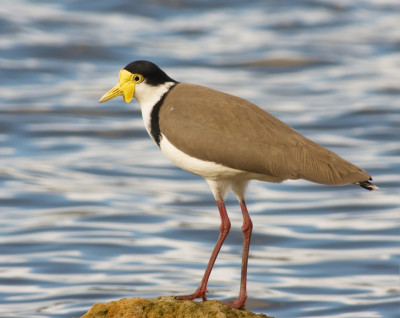As our urban landscape expands animals such as birds are forced to resort to using unconventional locations for nesting during their breeding season. These can include locations such as backyards, parks, sporting reserves nature strips and school grounds.
Many of our local bird species have different nesting requirements ranging from nests or natural hollows amongst the branches of trees, hard-to-see nests on the ground in open areas or even hidden nests made of reeds on the fringes of wetlands.
During the breeding season, it’s not uncommon for some species of birds, such as Magpies and Plovers (Masked Lapwings) to become aggressive towards people and pets for a short period of time, whilst they protect their young.
Magpies
These melodic birds often get a bad reputation for their sometimes-aggressive behaviour during breeding season. July through to December can see male magpie spending their time defending their nesting site from any unwelcome intruders.
Perceived threats can vary depending on individual birds and their location. Anything from walkers, cyclists, other birds, pets or just something unfamiliar may trigger swooping.
Plovers
Plovers, also known as Masked Lapwings, are a ground dwelling bird that will build their nest on the ground in small depressions or open grassy areas for a clear view of any approaching predators. The chicks hatch with a full covering of down that allows them to leave the nest and start feeding immediately.
It is for this reason that Plovers can be very protective of their nests and juvenile birds. Adults will resort to swooping, loud noises and distractions to try to lure perceived predators away from their young.
What you can do:
- Whilst swooping birds can be a frightening experience, remember that only 10% - 15% of birds will swoop.
- Understand that swooping is a natural behaviour and occurs if the bird perceives you as a threat to their nest or young.
- Where there is a known swooping bird, try to avoid the area. If this is not possible, move through the area quickly but without running.
- Remember that a bird will only swoop for a short period of the year. Once the chicks have matured and can fend for themselves, the aggressive behaviour of the parents will decrease.
- Check out the national Magpie Alert website to log a swooping bird or check for reports around your local area. https://www.magpiealert.com/
As a community it is important to appreciate that living alongside native wildlife is a positive aspect of urban environments and that we need to accommodate the natural behaviours of our urban wildlife.
All native wildlife is protected under the Wildlife Act 1975, and it is illegal to harass or harm native birds or other wildlife without authorisation.
Council is not authorised to remove swooping birds. If a problem bird is located on private property and requires removal, a permit (Authority to Control Wildlife) is required from DELWP.
Department of Environment, Land, Water and Planning (DEWLP) – Call 136 186 or visit https://www.wildlife.vic.gov.au/managing-wildlife/swooping-birds
Wyndham City Council is not authorised to remove swooping birds but can install temporary sign in parks or reserves to alert residents of a swooping bird during their breeding season.
